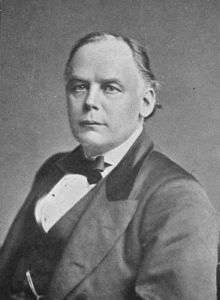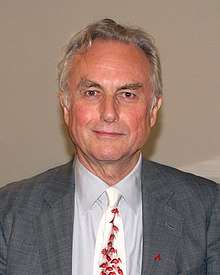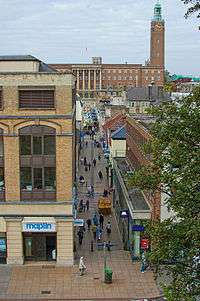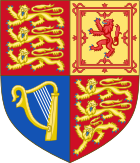Irreligion in the United Kingdom
Irreligion in the United Kingdom refers to the prevalence of agnosticism, atheism, nontheism, secular humanism, and generally, the absence, indifference to, or rejection of religion in the country. Historically, the growth of irreligion in the UK has followed a European-wide pattern of secularisation.[2]
Religion in the United Kingdom (2015 research)[1]
The first British census to gather data on religion, in 2001, showed that there were 7.7 million irreligious people in the country. The wording of the question was criticised by demographers, humanists, and secularist groups for use of a leading question ("What is your religion?"). This question continued in a revised format in the next census in 2011 counted 14.1 million irreligious people, which made irreligion the second-largest viewpoint on religion after Christianity, larger than the combined populations of non-Christian religions in the UK, and the category which underwent most growth between censuses. Other surveys, such as the annual British Social Attitudes Survey, which asks a different question than the Census ("Do you regard yourself as having a religion? If yes, which?"), frequently estimate that non-religious are in the majority (52% in 2019, compared to 38% Christian denominations).[3] Humanists UK is a secular charity which aims to represent this community, and lobbies government on their behalf.
Freedom to be irreligious had been limited by the country's blasphemy law, which punished criticism and mockery of Christianity, particularly the state Church of England. The last conviction was in 1977, with the law being abolished in England and Wales in 2008. Similar offences remain in statute in Scotland and Northern Ireland, and remain theoretically incompatible with the Human Rights Act 1998 and European Convention on Human Rights.
1700–1850
Organized activism for irreligion in the United Kingdom derived its roots from the legacy of British nonconformists. The South Place Religious Society, which would later become associated with the Ethical movement, was founded in 1793 as an organization of Philadelphians or Universalists.
In 1811 “The Necessity of Atheism” was published by a young oxford student, Percy Bysshe Shelley. It was one of the first printed, open avowals of irreligion in England.
The Oracle of Reason, the first avowedly-atheist periodical publication in British history, was published from 1841 to 1843 by Charles Southwell. It suffered from numerous imprisonments of its staff, including Southwell, George Holyoake and Thomas Paterson, for missives deemed "blasphemous" by the authorities (Holyoake was the last person in Britain convicted of blasphemy in a public lecture). Holyoake took to publishing The Movement (1842–1845) following his six-month sentence, which later became The Reasoner (1845–1860) and shifted to a larger focus on social issues facing the British working class, increasing the publication's readership. It was during this time that Holyoake developed his idea for the replacement of Christianity with an ethical system based upon science and reason, terming his proposal "secularism".[4]
1850–1900

George Holyoake's coining of the word secularism in 1851 offered the English-speaking world the clarification of the nascent movement for separation of religion and state. The National Secular Society, founded in 1866 by politician Charles Bradlaugh, spearheaded the advocacy for freeing citizens from absolute government requirements involving religious observances; the Leicester Secular Society was founded in 1851. Bradlaugh's 1880 election to Parliament brought on a decade-long dispute over the demanded right to affirm declarations of office rather than swear oaths, as he was denied his seat for five years by a ruling that he had no right to affirm and resolutions preventing him from swearing an oath. When Bradlaugh was ultimately admitted in 1886, he took up the issue and saw the Oaths Act 1888 passed, which confirmed the right to optionally affirm declarations for inaugurations to office and offering testimony to government bodies.[5]
In 1881, The Freethinker began circulation as Britain's longest-running humanist periodical. In 1896, the Union of Ethical Societies was formed in the United Kingdom by American Stanton Coit as a union of pre-existing British Ethical movement societies; this group would later become known as the Ethical Union and the British Humanist Association.[6] In 1899, the Rational Press Association was formed by a group of free-thinkers including Charles Albert Watts and George Holyoake.
Meanwhile, the South Place Religious Society became further aligned with organized secularist advocacy during the tenure of Moncure D. Conway as minister of the congregation; Conway, an American Unitarian minister who served from 1864–1885 and 1892–1897, moved the congregation further away from doctrinal Unitarianism, and spent the break in his tenure (during which Stanton Coit served in his stead) writing a biography of American revolutionary ideologue Thomas Paine. In 1888, the South Place Religious Society became the South Place Ethical Society, now known as the Conway Hall Ethical Society.
20th century

The 1960s were a significant time for irreligion, as the Ethical Union rebranded as the British Humanist Association, which went on to co-found the International Humanist and Ethical Union and create a symbol for humanism, the Happy Human.[6] Broadcasters such as Margaret K. Knight sensationalised Britain with open advocacy of non-religious values and secular education.[7] Senior figures in the British humanist movement went out to take on leading roles in institutions such as UNESCO, the World Health Organization, and the Food and Agriculture Organization.[8]
John William Gott, a working man of Bradford, West Yorkshire, attacked religion, especially Christianity, seeing it as reducing the opportunity for a socialist revolution. His lectures on rationalism and scepticism, and anti-Christian pamphlets, saw him jailed for blasphemy in 1911. Liberal Prime Minister H. H. Asquith was one of a group of Members of Parliament who proposed an ultimately unsuccessful piece of legislation to abolish blasphemy offences. Gott was jailed again ten years later for a pamphlet showing Jesus as a clown, and died in 1922 soon after his nine-month sentence which included hard labour despite his worsening physical condition. There was a public backlash against his sentence.[9]
Gott was the last Briton jailed for blasphemy, but the offence remained a technical crime through common law until being abolished in the Criminal Justice and Immigration Act 2008.
Evolutionary biologist Richard Dawkins, who first came to prominence in 1976 following the release of The Selfish Gene, increasingly figured in British irreligion with the release of his 1986 work The Blind Watchmaker, in which he argued in favour of evolutionary natural selection as opposed to intelligent design and creationism.
21st century

In the 21st century, New Atheism became a popular topic of debate, support and critique in the United Kingdom. Dawkins' 2006 book The God Delusion and Christopher Hitchens' 2007 book God Is Not Great were considered emblematic works of the era among British authors, and Dawkins advocated for the Brights movement.[10] The Atheist Bus Campaign was inaugurated during this time, in which advertisements on double-decker buses were purchased by the British Humanist Association in order to advocate non-belief in the supernatural; the campaign caused controversy and complaints to authorities, but soon spread to other countries and continents, taking root in the United States as a variety of atheist billboard campaigns.[11] Atheism is expected to be the dominant position on the existence of God by 2038.[12] A 2009 survey of 1,000 teenagers aged 13 to 18 reports that two-thirds of British teenagers do not believe in God.[13]
The rise in irreligion was confirmed in the UK's 2011 census, which saw irreligion rise from 7.7 million in 2001 to 14.1 million, a rise of 10.3 percentage points. The local authority with the highest level of irreligion was Norwich, the county town of Norfolk, where the level was 42.5%.[14] Religion has the least influence on youth.[15] According to the 2011 census, 25% of England has no religion, 7% of Northern Ireland,[16] one third in Scotland and one-third of Wales.[17]
According to YouGov, Christianity is perceived to be on the decline.[18][19] Mori Polls have shown that British Christians support a secular state.[20][21][22] Britons are amongst the most skeptical about religion.[23]
Statistics from the Office of National Statistics published in 2019 showed that the number of non-religious people in Britain has increased by 46% since 2011 (up to a total of 39% of the population), with over 8 million more people declaring that they do not belong to any religious group. As well as this, the figures also show a 15% decline in the number of people identifying as Christian.[24][25]
Irreligious British politicians
Non-religious people have risen to the highest ranks of UK politics, including several Prime Ministers, Deputy Prime Ministers, and Leaders of the Opposition.
Among Prime Ministers, Liberal leader David Lloyd George lost his religious faith as a young man, and became an agnostic deist,[26][27][28] though he continued to attend chapel and identify politically with Nonconformists. The Labour Prime Minister Ramsay Macdonald started out a devout Christian socialist, but moved progressively towards his life through Unitarianism and towards Ethical Culture, eventually joining the Ethical Union (later known as Humanists UK) and even chairing some of its meetings.[29][30][31][32] Clement Attlee, Prime Minister for the Labour Party from 1945 to 1951, rejected organised religion and claims of the supernatural his whole life, despite growing up in a Christian household.[33] James Callaghan, also of Labour, was Prime Minister from 1976 to 1979. He left the Baptist Church as a young man when he became more involved in politics.[34] Conservative Prime Minister Winston Churchill (1940–1945 and 1951–1955) was an atheist, saying "I do not accept the Christian or any other form of religious belief".[35]
Other party leaders have openly been non-religious. Past Opposition Labour Party leaders Michael Foot and Neil Kinnock were also atheists and humanists. Foot, much like Neil and Glenys Kinnock, was a patron of Humanists UK.[36][37] Rhodri Morgan, former MP and First Minister of Wales from 2000 to 2009, was an atheist and a humanist.[38][39] Former Deputy Prime Minister and Lib Dem leader Nick Clegg (2010–2015) is an agnostic atheist.[40][41] Ed Miliband, a former leader of the Labour Party from 2010 to 2015, is a Jewish atheist.[42] In 2019, several of the party leaders openly identified as humanist, including 2019 Liberal Democrats leader Jo Swinson (a member of Humanists UK),[43] who was married in a humanist ceremony;[44] Green Party of England and Wales co-leader Sian Berry (a patron of Humanists UK),[45] and Scottish Greens co-leader Patrick Harvie (a member of Humanist Society Scotland).[46]
Other influential atheists and humanists in British history include NHS founder Nye Bevan,[47] and "father of the welfare state" William Beveridge.[48]
Other contemporary British atheist politicians include Ken Livingstone of Labour, who was London's first mayor between 2000 and 2008. He left Christianity at the age of 11.[49] Outside of elected politicians, Tony Blair's Director of Communications Alastair Campbell is an atheist and was infamous during his time in post for once telling a journalist "We don't do god".[50] Conservative Party chair James Cleverly and former Chancellor of the Exchequer Sajid Javid are both openly atheists.[51][52][53]
Over 110 Parliamentarians in the UK are members of the All-Party Parliamentary Humanist Group, which means the non-religious have substantial representation among MPs and Lords.[54]
See also
References
- "United Kingdom". Association of Religion Data Archives. 2015. Retrieved 18 May 2020.
- Lilla, Mark (31 March 2006). "Europe and the legend of secularization". The New York Times. Retrieved 12 August 2012.
- "Latest British Social Attitudes survey shows continuing rise of the non-religious". Humanists UK. 11 July 2019. Retrieved 27 July 2019.
- "George Holyoake : Biography". Spartacus-Educational.com. Retrieved 27 February 2019.
- Religion and Mental Health - Google Books. Books.google.co.uk. Retrieved 9 August 2012.
- "Our History since 1896". Retrieved 2 November 2013.
- "Margaret Knight". Retrieved 13 May 2016.
- Pollock, David. "Humanism: Beliefs and Values". david-pollock.org.uk. Retrieved 13 May 2016.
- "John Gott". Oxforddnb.com. Retrieved 18 August 2013.
- James Wood (26 August 2011). "The New Atheism | Books". London: The Guardian. Retrieved 9 August 2012.
- Andrew Brown (26 April 2012). "The persistence of superstition in an irreligious Britain | Andrew Brown | Comment is free | guardian.co.uk". London: Guardian. Retrieved 9 August 2012.
- Webb&, Al. "Atheists likely to outnumber Christians in England in 20 years". Washington Post. Retrieved 9 August 2012.
- "Two thirds of teenagers don't believe in God". London: The Daily Telegraph. 22 June 2009. Retrieved 9 August 2012.
- Steve Doughty (13 December 2012). "Census 2011 religion data reveal there are 4m fewer Christians and 1 in 4 is now an atheist | Mail Online". London: Dailymail.co.uk. Retrieved 18 August 2013.
- "British Youth reject Religion". Yougov.co.uk. Retrieved 18 August 2013.
- Devenport, Mark (11 December 2012). "BBC News - Census figures: NI Protestant population continuing to decline". Bbc.co.uk. Retrieved 28 September 2013.
- "BBC News - Census 2011: One third in Wales have no religion". Bbc.co.uk. 11 December 2012. Retrieved 28 September 2013.
- "Hard evidence: is Christianity dying in Britain?". Theconversation.com. Retrieved 27 November 2013.
- "Secularism in Britain". YouGov. Retrieved 6 September 2013.
- "Religious and Social Attitudes of UK Christians in 2011" (PDF). C3414097.r97.cf0.rackcdn.com. Archived from the original (PDF) on 29 October 2013. Retrieved 28 September 2013.
- "Christians don't want religion to 'influence public life'". London: Telegraph. 14 February 2012. Retrieved 28 September 2013.
- "Ye of little faith". Prospect Magazine. Retrieved 17 February 2015.
- "UK among most sceptical in world about religion". The Daily Telegraph. London. 17 April 2014.
- "Religion by Local Authority, Great Britain, 2011 to 2018 - Office for National Statistics". www.ons.gov.uk. Retrieved 26 March 2020.
- "Number of non-religious people in Britain jumps by 46%, new figures show". Humanists UK. Retrieved 26 March 2020.
- Cregier, Don M. (1976). Bounder from Wales: Lloyd George's Career Before the First World War. Columbia and London: University of Missouri Press. p. 13. ISBN 0-8262-0203-9.
- Crosby, Travis L. (2014). "The Education of a Statesman". The Unknown Lloyd George. London: I. B. Tauris. p. 6. ISBN 9781780764856.
- Owen, David (2014). The Hidden Perspective: The Military Conversations 1906–1914. London. p. 31.
- Lord Godfrey Elton (1939). The Life of James Ramsay Macdonald (1866-1919). Collins. p. 94.
- Turner, Jacqueline (2018). The Labour Church: Religion and Politics in Britain 1890-1914. I.B.Tauris & Co Ltd.
- Hunt, James D. (2005). An American Looks at Gandhi: Essays in Satyagraha, Civil Rights, and Peace. Promilla & Co Publishers Ltd.
- Marquand, David; Ramsay MacDonald; London, 1977; p. 24
- "The politics of faith | Nick Spencer | Comment is free". London: theguardian.com. 5 May 2010. Retrieved 18 August 2013.
- "James Callaghan". Infobritain.co.uk. Archived from the original on 24 September 2015. Retrieved 18 August 2013.
- Gilbert, Martin (1991). Churchill: A Life. London: Heinemann. ISBN 0-434-29183-8. Page 92.
- "Rt Hon Lord Kinnock PC". Humanists UK. Retrieved 5 March 2018.
- "BHA mourns Rt Hon Michael Foot, activist, journalist and humanist (1913-2010)". Humanists UK. 3 March 2010. Retrieved 5 March 2018.
- "Public humanist funeral for Rhodri Morgan at National Assembly for Wales". Humanists UK. 31 May 2017. Retrieved 31 May 2017.
- "Rhodri Morgan funeral to be held at the Senedd, Cardiff". BBC Wales News. 31 May 2017. Retrieved 31 May 2017.
- "Election '10: 10 things you didn't know about Nick Clegg". The Times. 21 April 2008. Archived from the original on 19 April 2010. Retrieved 18 April 2010.
- Peev, Gerri (20 December 2007). "Religion: I don't believe in God". The Scotsman. Edinburgh. Retrieved 14 April 2010.
- "Ed Miliband: I don't believe in God". London: Telegraph. 29 September 2010. Retrieved 18 August 2013.
- "Honorary Members". Humanists UK. Retrieved 23 July 2019.
- "Jo's response to our questions". Humanist and Secularist Liberal Democrats. 5 July 2019. Retrieved 23 July 2019.
- "Sian Berry AM". Humanists UK. Retrieved 23 July 2019.
- "Register of interests: Patrick Harvie MSP". Scottish Parliament. Retrieved 23 July 2019.
- "History of Socialism: Aneurin Bevan". Spartacus Educational. Retrieved 6 July 2018.
- Jose Harris, William Beveridge: a biography (1997) pp 1, 323.
- "Ken Livingstone interview". Somethingjewish.co.uk. 17 November 2005. Retrieved 18 August 2013.
- "Alastair Campbell: I'm a pro-faith atheist". Christian Today. Retrieved 5 March 2018.
- Perraudin, Frances (1 November 2015). "Tory MP reveals he smoked marijuana and watched online porn". The Guardian. ISSN 0261-3077.
- Farley, Harry (30 April 2018). "Sajid Javid: What has the new home secretary said about faith?". Christian Today. Archived from the original on 1 May 2018. Retrieved 30 April 2018.
- Peck, Tom (4 June 2018). "Beneath Sajid Javid's Teflon coating, the cracks are starting to show". The Independent. Archived from the original on 17 June 2018. Retrieved 17 June 2018.
- "Humanists in Parliament". British Humanist Association. British Humanist Association. Retrieved 9 July 2015.
